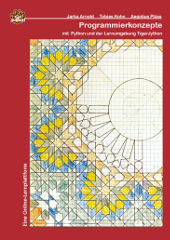Produkt 1.000.000.000 (Schleifen)
Gesucht werden zwei natürliche Zahlen, deren Produkt eine Milliarde beträgt, wobei keine der beiden Zahlen die Ziffer Null enthalten darf. Die Komplexität der Schleife sollte besser als O(n) sein und das Ergebnis innerhalb einer Sekunde ausgegeben werden.
0 Kommentare
6 Lösung(en)
for a in range(2,20000000):
if '0' in str(a) or '0' in str(int(10**9/a)): continue
if (10**9/a).is_integer():
print(str(a)+' * '+str(int(10**9/a))+' =',str(10**9))
break
Lösung von: rob ert (tub)
inp = 1_000_000_000
trailing_zeros = len(s := str(inp)) - len(s.rstrip("0"))
assert "0" not in str(a := 2**trailing_zeros)
print(f"{a} * {inp//a} = {inp}")
Lösung von: Name nicht veröffentlicht
Number.prototype.endsWith = function(num) {
return this.toString().endsWith(num.toString());
}
Number.prototype.contains0 = function() {
return this.toString().includes('0');
}
const LIM = Math.ceil(Math.sqrt(1e9));
let result = [],
i = 2;
console.time();
while (i <= LIM) {
if (!i.contains0()) {
let j = 1e9 / i;
if (Number.isInteger(j) && !j.contains0())
result.push([i,j]);
}
switch (true) {
case i.endsWith(8): i += 4; break;
case i.endsWith(2):
case i.endsWith(6): i += 2; break;
default: i++;
}
}
console.timeEnd();
console.log(result);
Lösung von: Lisa Salander (Heidi-Klum-Gymnasium Bottrop)
// NET 6.0 | C# 10.x | VS 2022
var n = 1_000_000_000;
var r = n.GetPrimeFactors();
Console.WriteLine($"{n} = {r.GetResult()}");
// Lösung mittels Primfaktorzerlegung -> O(log n)
// Zeit: 10 ms
public static class Extensions {
public static IEnumerable<int> GetPrimeFactors(this int n) {
var i = 2;
while (i <= n) {
if (n % i == 0) {
n /= i;
yield return i;
}
else i++;
}
}
public static string GetResult(this IEnumerable<int> lst) => string.Join(" * ", lst.GroupBy(x => x).Select(x => new { b = x.Key, e = x.Count() }).Select(x => $"{ Math.Pow(x.b, x.e) }"));
}
Lösung von: Jens Kelm (@JKooP)
// C++ 17
#include <iostream>
#include <vector>
#include <map>
#include <iomanip>
// Zeit: 0.03 ms
std::vector<int> get_prime_factors(int n) {
std::vector<int>v{};
auto i{ 2 };
while (i <= n) {
if (n % i == 0) {
n /= i;
v.push_back(i);
}
else ++i;
}
return v;
}
std::map<int, int> get_grouped_vector(const std::vector<int>& v) {
std::map<int, int> m;
for (const auto& i : v)
if (m.count(i)) m[i]++;
else m.emplace(i, 1);
return m;
}
int main() {
constexpr auto n{ 1'000'000'000 };
const auto pf{ get_prime_factors(n) };
const auto gv{ get_grouped_vector(pf) };
auto it{ gv.begin() };
const auto x{ pow(it->first, it->second) };
const auto y{ pow((++it)->first, it->second) };
std::cout << std::fixed << std::setprecision(0) << n << " -> " << x << " * " << y << "\n";
}
Lösung von: Jens Kelm (@JKooP)
' VBA
' "Microsoft Scripting Runtime" einbinden
Function GetPrimeFactors(ByVal n As Long)
Dim arr() As Integer, c As Integer
Dim i As Long
i = 2
Do While i <= n
If n Mod i = 0 Then
n = n / i
ReDim Preserve arr(c)
arr(c) = i
c = c + 1
Else
i = i + 1
End If
Loop
GetPrimeFactors = arr
End Function
Function GetGroupedArray(arr As Variant) As Scripting.Dictionary
Dim dic As Scripting.Dictionary
Dim i As Variant
Set dic = New Scripting.Dictionary
For Each i In arr
If dic.Exists(i) Then
dic(i) = dic(i) + 1
Else
dic.Add i, 1
End If
Next
Set GetGroupedArray = dic
End Function
Sub Main()
Const NUM As Long = 1000000000
Dim dic As Scripting.Dictionary
Dim x As Long, y As Long
Set dic = GetGroupedArray(GetPrimeFactors(NUM))
x = dic.Keys(0) ^ dic.Items(0)
y = dic.Keys(1) ^ dic.Items(1)
Debug.Print x, y
End Sub
Lösung von: Jens Kelm (@JKooP)
Verifikation/Checksumme:
512 und 1.953.125
Aktionen
Neue Lösung hinzufügen
Bewertung
Durchschnittliche Bewertung:
Meta
| Zeit: | |
| Schwierigkeit: | Mittel |
| Webcode: | 3f7i-j2as |
| Autor: | () |




